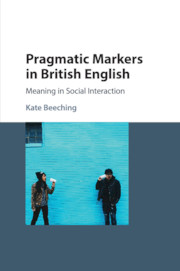Book contents
- Pragmatic Markers in British English
- Pragmatic Markers in British English
- Copyright page
- Contents
- Figures
- Tables
- Book part
- Glossary
- Glossary
- 1 ‘Well I mean I just sort of like you know…’
- 2 Corpus approaches, choice of markers and methodology
- 3 Well
- 4 Just
- 5 You know
- 6 Like
- 7 Sort of
- 8 I mean
- 9 Conclusion
- Appendices
- References
- Index
- References
References
Published online by Cambridge University Press: 05 February 2016
- Pragmatic Markers in British English
- Pragmatic Markers in British English
- Copyright page
- Contents
- Figures
- Tables
- Book part
- Glossary
- Glossary
- 1 ‘Well I mean I just sort of like you know…’
- 2 Corpus approaches, choice of markers and methodology
- 3 Well
- 4 Just
- 5 You know
- 6 Like
- 7 Sort of
- 8 I mean
- 9 Conclusion
- Appendices
- References
- Index
- References
- Type
- Chapter
- Information
- Pragmatic Markers in British EnglishMeaning in Social Interaction, pp. 236 - 251Publisher: Cambridge University PressPrint publication year: 2016



